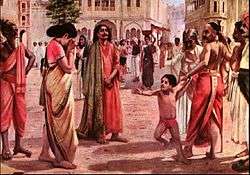Raghuvanshi
Raghuwanshi is a historical Indian dynasty, believed to be an offshoot of the Suryavansh lineage of kings tracing its ancestry to Surya. It is called Raghuwansha after Raghu, a king who protected the sacrificial horse of Ashwamedha from Indra. Any king who belongs to Raghuvansha, as a result also belongs to Suryavansh. However, in 5th century CE many different tribes like Scythians, Huns and Sakas invaded India and gradually adopted various aryan royal dynasties.[1] Raghuwanshi kings like Mandhata, Harishchandra, Sagara, Bhagiratha, Dilīpa, Raghu, Aja, Dasaratha and Rama.
Kalidasa's work, Raghuwansh narrates the epic of the Raghuwanshi in 19 sargas (cantos).[2]
Notable people

Several legendary kings came from the Solar dynasty and are referred to as Raghuvanshi after their ancestor, the king Raghu.
- Mandhata, who is said to have ruled the entire earth during the Vedic period, and defeated the Indra-head of Devatas.
- Sagara, a king who was tricked by Indra into a conflict with the sage Kapila, leading to the death of his 60,000 sons, the descent of the Ganges to earth, and his sons' revival
- Harishchandra, the king of Ayodhya, believed to be an exemplar of honesty
- Dilīpa, said to be the most righteous and chivalrous emperors of the Ikshvaku dynasty
- Bhagirath said to be the legendary king of the Ikshvaku dynasty, who brought the River Ganga, personified as the river goddess Ganga, to Earth from the heavens
- Raghu II, whose descendants are known as Raghuvanshi. The Valmiki Ramayana refers to Raghukula, a clan of this king. Rama is known by many appellations (such as Raghava, Raghunandan and Raghukula Nayaka), indicative of his belonging to the family of Raghu
- Aja, son of King Raghu
- Dasaratha, son of Aja and father of Rama, Lakshman, Bharath and Shatrughan
- Ram, he is considered the seventh avatar of the god Vishnu. He is worshiped by every Hindu. Many Hindus include his name in either their first or last name. Rama's story before he became king of Ayodhya is recounted in the Ramayana. After he ascended the throne, he performed the Ashwamedha Yajna. Bharata, his younger brother, won the country of Gandhara and settled there
- Lava and Kusha - They were the twin sons of Rama and his wife Sita. Lava ruled south Kosala while Kusha ruled north Kosala, including Ayodhya. Kusha married "Nagkanya" "Kumuddhati", sister of Kumuda. After Kusha the following kings of the solar dynasty ruled Ayodhya:
- Śuddhodana
- Sumitra, the last king of Ayodhya from Raghuvanshi dynasty.
References
- History of Ancient India: From 7300 BC to 4250 BC By J.P. Mittal page 101 onwards
- Raghuvaṃśa of Kālidāsa - Edited with extracts & notes etc by Narayan Ram Acharya Kavyatirtha, Chaukhambha Publishers, Varanasi, 2nd ed (2002), Appendix 2